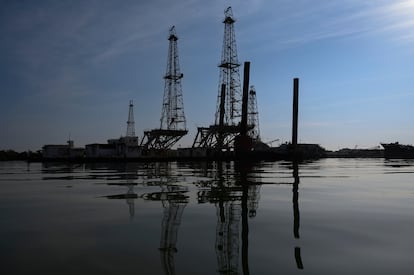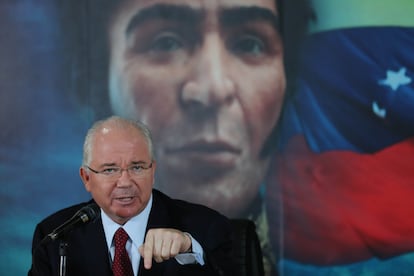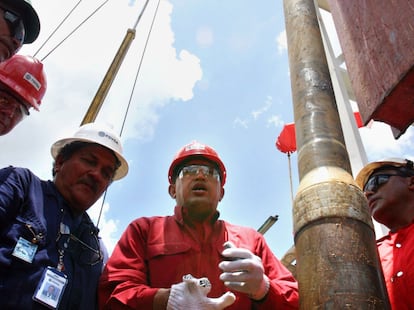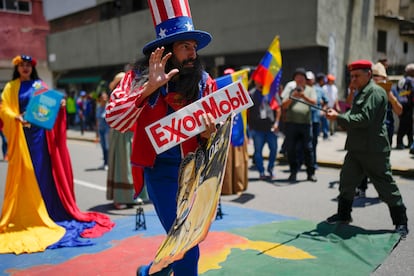The renewed dispute between ExxonMobil and Venezuela: The story of a long-standing feud
The Maduro government is accusing the oil company of lobbying to facilitate competitor Chevron’s departure from Venezuela, while also claiming multi-billion-dollar oil wells in Guyana as its own

When the government of Venezuelan President Nicolás Maduro deploys the classic leftist narrative about the existence of global corporations — tributaries of “imperialism” that exploit people’s resources — the verbal artillery is often reserved for a single oil company: ExxonMobil.
The energy multinational — the largest in the world — had a bitter, consequential confrontation with the Venezuelan government more than 10 years ago. The enmity still resonates today.
In October 2014 — when Rafael Ramírez was president of PDVSA, Venezuela’s state-owned oil company — the International Centre for Settlement of Investment Disputes (ICSID), a body within the World Bank, ruled in favor of Exxon in a lawsuit against the Maduro government. The ruling required the Venezuelan state to pay $1.6 billion in compensation to this corporate giant for having nationalized its assets within the country.
Emboldened by high oil prices and the multibillion-dollar national revenues during the 2006-2012 term, former Venezuelan president Hugo Chávez — who was elected in 1999 and governed until his death in 2013, when he was succeeded by Maduro — sought to shape his political project. With his United Socialist Party of Venezuela (PSUV) — still the ruling party today — he carried out an aggressive wave of nationalizations of the country’s productive structure. These expropriations had serious consequences for the national economy and a significant impact on the energy sector.
The new legal framework for oil — created by Chávez in 2005 — established the transition of existing operating agreements to the state-controlled joint venture model, guaranteeing PDVSA a majority stake in all activities related to the oil sector.

PDVSA took control of the oil well operations and immediately experienced strong tensions with Exxon, which — unlike other companies — did not accept the new policy. Exxon claimed breach of contract. At that time, in 2012 — with the price of crude oil soaring to $100 a barrel and national revenue from oil revenues in the billions — PDVSA was still a powerful and operational company, despite its administrative turmoil.
After the euphoria of the Chavista nationalizations, Venezuela has had to face costly lawsuits in international courts involving cases similar to the ones filed by Exxon’s. These are companies demanding compensation for the seizure of their assets, which were confiscated in the name of national sovereignty by Hugo Chávez and his ministers between 2007 and 2013.
Beginning in 2006, the Bolivarian Revolution repealed the structure of the Oil Opening Policy, which was designed during the late-1990s. This exploitation model encouraged massive investments by foreign companies — such as Chevron, Exxon, BP and Mitsubishi — that would operate alongside PDVSA (with very low royalties) for the first time since the nationalization of oil in 1976. This project significantly increased the production and export of Venezuelan crude oil and its derivatives. However, the Chávez administration considered the setup to be detrimental to national sovereignty.
In 2007, when the break with Exxon was finalized and the lawsuit in international courts ensued, the Venezuelan government launched an aggressive campaign against Exxon in the country. Billboards and television spots accused the conglomerate of being an enemy of national sovereignty, portraying it with all the trappings of classic Latin American leftist discourse.

“ExxonMobil is a company that’s an enemy of Venezuela [...] and of the Venezuelan people,” Nicolás Maduro recently declared. Vice President Delcy Rodríguez has accused the company of instigating the territorial conflict with Guyana and undermining the nation’s rights to the oil-rich Essequibo region, which Caracas now claims. Maduro asserted that Exxon is acting “out of revenge against the country,” while pushing “a persecution and extermination” agenda against Chevron, the U.S. multinational allied with the Venezuelan government.
After breaking with Venezuela, Exxon began business dealings with neighboring Guyana, a nation that has discovered significant offshore oil fields in areas it legally controls, but which Venezuela claims as its own. They’re part of the Essequibo region, a territory that belonged to Venezuela and was colonized by the U.K. in the 19th century. Today, it’s part of the jurisdiction of the modern-day Republic of Guyana.
As Venezuela sank into political unrest, economic chaos, legal uncertainty and corruption — causing its crude production to decline dramatically in recent years — Guyana worked rapidly with Exxon. Along with other corporations, the firm has brought the Starboek Block — 120 miles offshore Guyana — into production very quickly, boosting Guyanese output. The country continues to attract capital to exploit these highly-endowed offshore wells.
After holding a referendum on Venezuelan rights in the Essequibo region at the end of 2023, the Maduro administration has toughened its stance regarding this territory, even threatening prison sentences for anyone who questions Venezuelan rights to it. The Essequibo region comprises three-quarters of present-day Guyana.

With the rise in diplomatic tensions between Venezuela and Guyana, accusations from Caracas against Exxon have proliferated. The government claims that the conglomerate has been conspiring against Venezuela’s interests and colluding with Guyana in the territorial dispute. “It was Exxon that moved to sanction Chevron, that’s clear. That’s how corporate pressures, lobbying, work,” Minister of Interior Diosdado Cabello stated this past week, supporting the statements of Nicolás Maduro and Delcy Rodríguez.
After the Guyanese government publicly denounced the entry of a Venezuelan vessel into territorial waters it controls — although Venezuela claims it as its own — Cabello called a press conference and announced before the National Electoral Council that the local population will elect eight representatives from Guyana Essequibo in the upcoming Venezuela legislative elections in May.
Sign up for our weekly newsletter to get more English-language news coverage from EL PAÍS USA Edition
Tu suscripción se está usando en otro dispositivo
¿Quieres añadir otro usuario a tu suscripción?
Si continúas leyendo en este dispositivo, no se podrá leer en el otro.
FlechaTu suscripción se está usando en otro dispositivo y solo puedes acceder a EL PAÍS desde un dispositivo a la vez.
Si quieres compartir tu cuenta, cambia tu suscripción a la modalidad Premium, así podrás añadir otro usuario. Cada uno accederá con su propia cuenta de email, lo que os permitirá personalizar vuestra experiencia en EL PAÍS.
¿Tienes una suscripción de empresa? Accede aquí para contratar más cuentas.
En el caso de no saber quién está usando tu cuenta, te recomendamos cambiar tu contraseña aquí.
Si decides continuar compartiendo tu cuenta, este mensaje se mostrará en tu dispositivo y en el de la otra persona que está usando tu cuenta de forma indefinida, afectando a tu experiencia de lectura. Puedes consultar aquí los términos y condiciones de la suscripción digital.








































